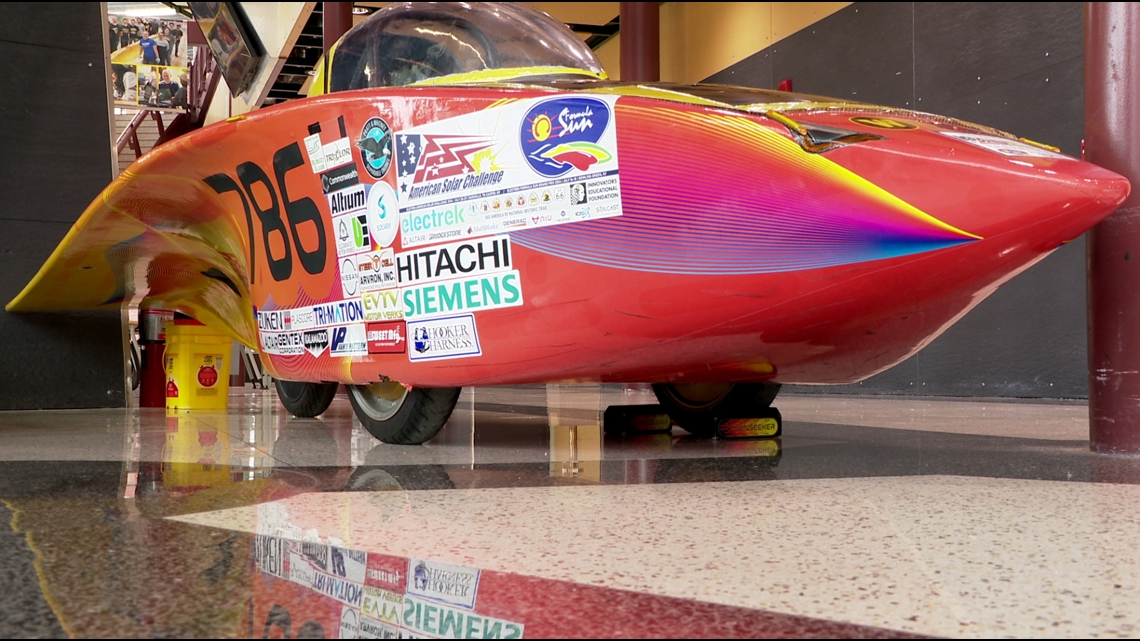Amid rise of EVs, constantly updating technology, WMU, KCC set to receive combined $4.7 million for electric vehicle, semiconductor learning programs
The plan is meant to keep students up to speed with the needs of the industry and comes as EV manufacturing has begun branching toward the state’s west side.
KALAMAZOO, Mich. — Western Michigan University senior Eliza Eaton is part of the team responsible for the Sunseeker 23, a solar-powered racing vehicle meant to compete cross-country.
“It took us three years,” Eaton said. “And I know I spent a lot of all-nighters.”
An aerospace engineering major, Eaton said part of her passion for her craft came from seeing Western’s solar car team for the first time as she toured the campus.
“The whole goal is to design, build and race a solar-powered car across the country,” Eaton explained. “So last year, we started in Nashville, Tennessee, and we drove to Casper, Wyoming.”


“It’s out there to prove the validity of solar technology and greener technology, battery technology,” she continued. “And it gives the students an opportunity to learn something they wouldn’t learn in their classes.”
But with constant new technological innovations in areas like engineering and automotive, for students like Eaton, it could be a challenge to keep up with rapidly-changing industries.
“That’s the scary part, right? Because I have no idea what they’re gonna need to know next year,” said Steve Butt, the dean of WMU’s College of Engineering and Applied Sciences. “So we’re trying to project out what that would be, right? But that’s, again, why we have the partners – because, as things change, we want to be able to make our curricular changes. So, again, our hope is that through this partnership, that can actually become a reality.”
While they may be prepared to face the challenge anyway, a new $4.7 million plan involving WMU, Kellogg Community College and the Michigan Economic Development Corporation (MEDC), is meant to help these local learning hubs keep up to speed and expand their technical learning programs in the areas of electric vehicles and semiconductors.
“A lot of times, there’s one big piece of equipment,” Butt said. “To be able to have that at scale to where I can teach 20 students at the same time in a laboratory is very, very tough. So what we’ll be able to do is figure out exactly how I can take that one big piece and actually bring it down into elements that I could teach in a classroom.”
The public-private partnership has roughly $700,000 going to Western and about $4 million to KCC.
“They came to us and they said, ‘In order for us to do this type of program, in order for us to meet the needs of the employers, as they’ve indicated to us, here’s the type of equipment we need, here’s the type of support we need for the students to be able to thrive in these programs. Here’s the type of curriculum we have to develop,'” said MEDC Director of Higher Education Partnerships Ava Attari.
“So we’ll go through that application with them, and we’ll review it, and then we’ll indicate whether it sounds like a good investment,” Attari explained. “And these sound like great investments.”
It also comes as electric vehicle manufacturing has begun branching toward the state’s west side, as plans like Ford’s BlueOval Battery Park set for Marshall have come into play.
Amid a changing industrial landscape, Attari also made mention of what she described in a press release as a “war for talent.”
“There’s huge stakes,” Attari said. “I mean, we’re already seeing gaps in what industry is going to be needing in the next 5, 10, 20 years, and the number of graduates that are going to be coming out with electrical engineering degrees or software developer degrees or technician degrees. And so for us, we’re really seeing this as an opportunity to kind of stem that flow, right like of the gap that’s going to be created.”
While more may be needed down the road to keep up, this is a plan leaders say will help those like Eaton become the innovators of the future.




